
But grow in grace and in the knowledge of our Lord and Savior Jesus Christ (2 Pet 3.18)
What We Believe
Delve into the Orthodox profession of faith, the Nicene Creed, with weekly teachings from Fr. John Vazquez: read here.
Coffee with the Fathers
Starting on September 9th, Coffee With the Fathers begins its weekly meeting at 8:15am at Alias Coffee on North Pearl St. in Albany. Check our calendar on our front page for an up to date schedule. We will read the Fathers of the Church and discuss their teaching, their context, the Faith and our lives today.
Bible Study
Study the Scriptures… and see your Life before you.
Bible Study is at 6pm on Saturdays following Vespers. Why is it important to Study the Scriptures? The Scriptures are our Life before us and they invite us to enter into them so that we can encounter Christ in a deeper way done most fully in the Divine Liturgy. Check out this interview with Fr. Bogdan Bucur to learn more about Reading Scripture Liturgically:
Sermons and Teachings
When all is said and done, there is only one means and only one method of treatment available, and that is teaching by word of mouth. — St. John Chrysostom, “On the Priesthood”
 Met. Saba (Isper)
Met. Saba (Isper)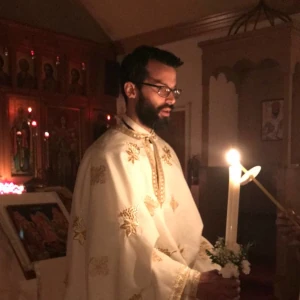 Fr. John Vazquez
Fr. John Vazquez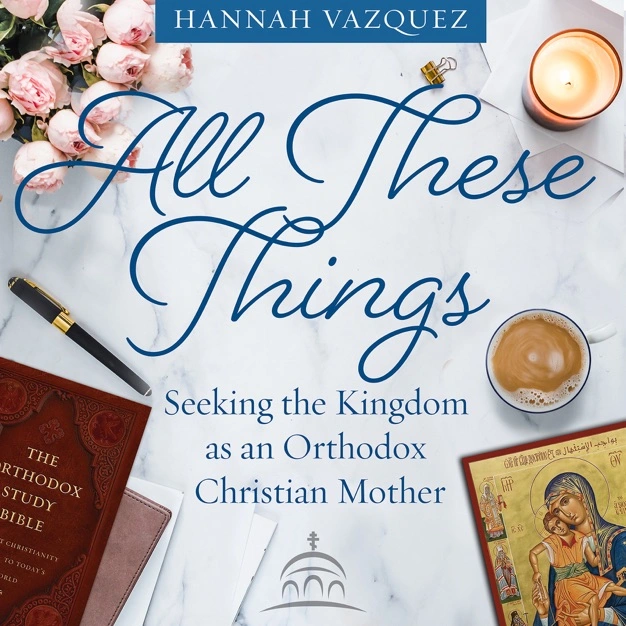 Kh. Hannah Vazquez
Kh. Hannah Vazquez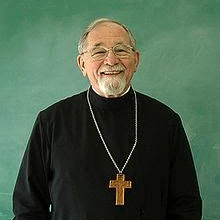 Fr. Thomas Hopko
Fr. Thomas Hopko Patristic Nectar
Patristic Nectar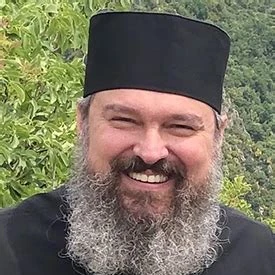 Fr. Silviu Bunta
Fr. Silviu Bunta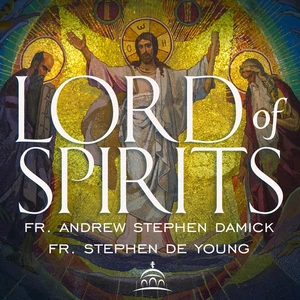 Lord of Spirits
Lord of Spirits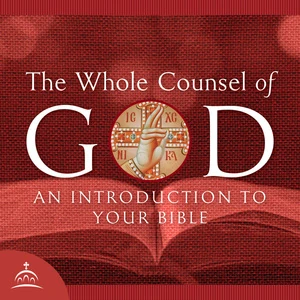 The Whole Counsel of God
The Whole Counsel of God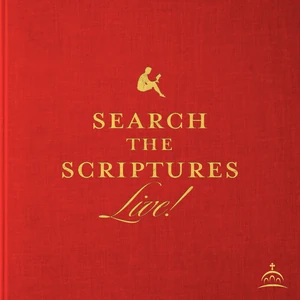 Search the Scriptures
Search the Scriptures
Common Questions
About the Diving Liturgy
What am I witnessing?
Ancient Christian worship as found in the Orthodox Church engages and heals all of the senses: our eyes are healed through beholding the beauty of the Church so that we can see things as they truly are; our minds are healed through a constant call to attention through prayer so that we can speak truth with our mouths; our hearts are healed through the divine Grace of God received in the Mysteries of the Holy Church so that we can hear and listen with compassion and tenderness; our hands are healed through the touch of sacred objects and the partaking of the most holy body and blood of our Lord Jesus in the holy Eucharist so that we can do the work of Christ in the world through the touch of our good works; and our intuition is healed so that we can follow the fragrance of Christ in whatever situation we find ourselves.
Am I required to participte?
You will hear people sing, you will see people cross themselves, kiss icons, sit and stand. You are not obligated to do any of these things but we invite you participate as you feel comfortable.
What about my children?
If you have young children, they, and the holy noise they bring with them, are welcome for all of the holy services. If necessary, feel free to take your child out into the hall for a break. The work of bringing children to Church is hard work but holy work. God bless you for undertaking this great endeavor, which is needed now more than ever. Children are welcome to participate in Sunday Education which takes place after the Eucharist.
Can I take Communion?
In the Orthodox Church, only baptized and chrismated Orthodox Christians may partake of the Holy Eucharist (communion). If you are not an Orthodox Christian and we are celebrating a Divine Liturgy you are welcome to come forward to receive a blessing with the chalice held over your head and receive a piece of blessed bread from the altar servers. Please stay for fellowship following the service and be sure to introduce yourself to the priest.
About the Orthodox lifestyle
Why do Orthodox Christians Pray to the Saints?
To begin, I should been clear that we don’t pray “to” the saints but we “ask for the prayers of” the Saints. There is no idolatry here when we ask a friend to pray for us.
In the Orthodox Church we believe that we have the potential to become “partakers of the divine nature” (2 Pet 1.4). We see for example that when Elijah’s bones were put on a dead man, the dead man rose from the dead (2 Kings 13.21). This could not happen if the Saint had not been a partaker of the divine nature—in other words, holy and sharing the power of God. Since we can become partakers of the divine nature we can become “sons of God“ (John 1.12, Rom 8.14, Gal 4.6, Phil 2.15, 1 John 3.1–2). As sons of God we will inherit that which is Christ’s (Eph 1.18, Col 1.12, Col 3.24). And since the Son of God, Jesus Christ, ascended into heaven as a man (Lk 24.51, Acts 1.9—prophesied and revealed in Dan 7.13) and sat at the right hand of the Father to receive his kingdom (Lk 22.69, Col 3.1) this is the “inheritance” that the Saints will receive as well.
It is true that there is one mediator between God and men—Jesus Christ (1 Timothy 2.5)—but we, as members of the body of Christ (Eph 5.30), participate in that mediation when we are baptized into that Body of Christ—the Church (Col 1.24). Since the Saints with a capital “S” are the ones that the Church has recognized as receiving this inheritance already—through miracles, answered prayers and revelation of their glory with God (Mt 17.3)—then we pray to them as ones with whom God has shared his power (In the gospels Jesus gives his disciples authority to cast out demons, heal the sick etc. Mt 10.8, Lk 9.2). Since Jesus shares this power with His holy ones (Saints) then we pray to them (or rather ask for their intercessions) because “the prayer of a righteous man availeth much (James 5.16). It is not that the Saints have a separate power from God but that in as much as they are united to Christ, they share in Christ’s ministry so to say (Homily 50 of St Macarius).
Finally, the Saints are those who are alive with Christ despite their passing from this life to the next (Col 3.3-4) and their prayers ascend before the throne of God (Rev 8.4). 2 Maccabees talks about how the departed righteous “repose in godliness”—in other words they are alive with God (2 Mac 12.45) like Moses and Elijah who appeared with Christ on Mount Tabor (Mt 17.3). In addition the Saints are there as “a great cloud of witnesses”—alive witnessing what is happening here on earth (Hebrews 12.1)
Did Jesus Pay Someone a Ransom to Deliver us from Death?
There is so much that has been written about this. I will simply offer a few words here. Sometimes it is said that this idea of Jesus paying a ransom with his death is a “western idea.” While it is true that the this idea of Jesus paying a ransom to the Father was born in the West, it is also true that the word ransom is used in Scripture, most notably in the gospels—Mt 20.28 and Mk 10.45.
There are a couple of things to point out. First, what does ransom mean? Ransom means: the release of property or a person in return for payment of a demanded price. Jesus did NOT pay a ransom to the Father or—very importantly—He did NOT pay a ransom to the Devil. In both of these cases we have a big problem. If Jesus paid a ransom to the Father we have a gross perversion of the Trinity with the Father as some kind of monster—this is NOT who our God is! On the other hand, if Jesus paid a ransom to the Devil, it means that the Devil had power over Him—NEVER!
What we believe as Orthodox Christians is that Jesus paid a ransom to death. These are the words that St Basil uses in his Divine Liturgy and this is the teaching of the Fathers of the Church. In other words, Jesus gave Himself to our condition—that of being mortal—in exchange for our freedom from death. All we need to do is join ourselves to Christ and we are liberated from the tyranny of death. Death is the condition of being separated from God and Jesus gave himself to this condition of Death so that there was nowhere we could be without Him… If I ascend up into heaven, thou art there: if I make my bed in hell, behold, thou art there (Ps 139.8) What a wonderful blessing and gift that our God has given us through His great love for us. Let us give thanks to Him every day for this gift.
Why Can't Girls Serve in the Altar? (Why Can't Women be Priests?)
This question is directly related to the related question of male priesthood in the Church. There are several important aspects to this question that are essential to highlight.
First—it is important to say that it is not because women are impure or less important than men. Eve is the last creature that God creates—she is the crown and pinnacle of creation. There is something of the story of creation and salvation that is being presented to us in the services of the Church where we see that Christ lays down his life for the Church who is his bride (Rev 21.2, Eph 5.25). We see that male and female are written into the fabric of creation and affirming the distinction as we see done in the Church is important because without this distinction of male and female there is no possibility for new life.
Second—the Most exalted and honored figure in the Church besides our Lord Jesus Christ is His Mother—the Theotokos: not John the Baptist, not Moses, not Elijah, not Basil the Great. If this is the case and even she was not a priest or bishop who served in the altar then we can understand that service in the altar says nothing about the value of a person.
Third—this question assumes that EVERY man can go into the altar however this is not true. The only men who are permitted to go into the altar are those who have been blessed to do so. This means that not just any person can waltz back into the altar. Think about the Temple in the Old Testament. Only the High Priest could go into the Holy of Holies—no other person was permitted, no matter what the gender. So we see that a person must have a reason and a blessing to go into the altar BUT we also see that when the Theotokos was taken to the temple as a three-year old she was taken into the Holy of Holies! This feast of the Entrance of the Theotokos into the Temple (Nov 21) teaches us that each of us is called to be—like the Theotokos—the place where God dwells. We no longer have to go to a certain place to find God for He dwells in each of us.
Fourth and Finally—Some women might wonder why a man is permitted to do something they cannot. Is there anything that a man is not permitted to do that a woman is? Yes—a man cannot give birth to a human being. The womb of a woman is comparable to the altar in many ways. A man—the priest—(but not every man or just any man, one who has been blessed or ordained) prepares a body in the altar and then brings it forth from the womb of the Church into to the world so that the world can commune with God himself (he prepares the body and blood of our Lord and then brings it out to the people). A woman (but not just any woman, one who is of age and is able to conceive and within a marriage—blessed or ordained) in a similar manner—prepares a body in her womb to bring forth into the world so that the world can commune with God (for we meet God in our neighbor Mt 25. 31–46). The Church is not a separate compartment of our life—it is our whole life! This is why a woman giving birth can and should be understood as part of the life of the Church and why the role of a mother is just as important as the role of a priest.
The depth of the symbolism and meaning that we find in the Church is astonishing. We are not going to a concert when we come to the Divine Liturgy so that we can be entertained. We are active participants in the re-creation of the world at level that is difficult to even fathom.
Why do Orthodox Christians use Incense in Worship?
The answer is three-fold and can be found in the Holy Scriptures. First we see in Exodus 30.1 that Moses is instructed to make an altar to burn incense on. We have then been instructed to worship with incense and further, the Scriptures tell us our prayers of worship are incense to the Lord. Psalm 140.2 or 141.2 says our prayers are like incense before God and again in Revelation 8.3–4 we see the same: Then another angel, having a golden censer, came and stood at the altar. He was given much incense, that he should offer it with the prayers of all the saints upon the golden altar which was before the throne. And the smoke of the incense, with the prayers of the saints, ascended before God from the angel's hand. Next, in Leviticus 16.13 we see that incense serves as a covering for the presence of God in the Holy of Holies. This is confirmed in Isaiah 6 in the vision of Isaiah—we see that smoke filled the house of the Lord. Then, finally we see in 2 Corinthians 2.15 that we ourselves are to become incense to God—a sweet smelling aroma: For we are to God the fragrance of Christ among those who are being saved and among those who are perishing. This of course is made possible by the Grace of the all-holy Spirit.
The Orthodox Church is full of symbols—(check out the great work of Jonathan Pageau for more on this). Often we think that a symbol is something that is not real, kind of like fake gold—but this is not the case in the Orthodox Church. In the Orthodox Church a symbol is the physical presence of a spiritual reality.
This is why our worship in the Church is so physical—candles, bells, incense, icons, vestments, gold, silver, crowns, oil, water, wine, bread—all of these things make present the Spiritual Reality that we experience in the context of our life in the Church.
The sweet smell which remains on us after a service then re-presents the Grace of the Holy Spirit which we receive at Church.
Why do we baptize infants?
There are several reasons why we baptize infants. First, we believe that every person should have the ability to be a member of the community—a member of the Church—so that they have access to the fruit of the Tree of Life—the Body and Blood of our Lord and savior Jesus Christ. Baptism, and the Chrismation that follow, are what make us members of the Body of Christ (Rom 6.3, 1 Cor 6.15, Eph 5.30) and able to partake of the Eucharist. Food is essential for us to grow and in this instance we grow in virtue and the likeness of God through partaking of His Body and Blood.
We see in the scripture that when the apostles were preaching and baptizing they were baptizing whole households—not just men, not just women, not just those 12 and up, not just free, not just those who intellectually assent—but whole households (Acts 10.24, 47, Acts 16.15, 1 Cor 1.16). Sometimes we might hear that someone has to be able to intellectually assent to the decision for baptism before they get baptized. While it is true that each of us must eventually accept the faith for ourselves it is not true that this intellectual assent is a prerequisite for baptism. Why is this?
Well, one obvious reason is that if this intellectual assent was required, that would exclude those with intellectual disabilities. Every single person is welcome in the Church if they are willing to abide by the teachings of Christ and His Church so that they can be transformed into “sons of God” (Gal 4.5). Another reason intellectual assent is not required for baptism is that the salvation of every person cannot be reduced to simply our personal relationship with Christ. In other words—salvation is not only individual—it is communal. We hear over and over in the gospels that our Lord heals people because OTHER people ask him to (Mt 8.10, 9.2, 15.28, Lk 5.20). In a similar manner we ask for healing and wholeness for the youngest members of our community.
Does any of this mean we believe that an infant is going to hell if they die before they are baptized? No, it does not mean that. We trust in God’s mercy and love when it comes to death before one is able to be baptized. What it does mean is that no member of the community is “less-than” because of age, intellectual ability or any other reason and that our salvation is not only individual but communal and not merely intellectual but also physical.

